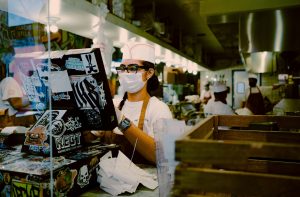Global warming poses a serious threat to restaurant workers. In particular, extreme heat in kitchens increases the likelihood of injuries, illnesses, and fatalities among workers. Many of these workers are also likely to face greater work instability.
A ROC United report examines pervasive problems that make restaurant kitchens dangerously hot, and calls OSHA to enact indoor heat regulations.
According to NASA and the National Oceanic and Atmospheric Administration, the last eight years have been the hottest on record. While this trend will only continue, many restaurants are inadequately prepared to mitigate the impact and, worse, have shown a disregard for keeping their workers safe and healthy.
Restaurant workers make up an essential part of the American economy. This industry is projected to reach $898 billion in sales in 2022 and comprises over 11 million workers across the United States. The restaurant industry is in a moment of significant growth, as it recovers from extensive layoffs at the start of the coronavirus pandemic in early 2020, when it is estimated over six million people lost their jobs.
In the kitchen of a restaurant where Ariana Lingerfeldt has worked for two years, the temperature could rise to over 100 degrees Fahrenheit—so hot that it isn’t uncommon for a worker to pass out or get dehydrated.
With prolonged heat that could stretch into the end of October, Lingerfeldt and millions of restaurant workers are worried that extreme heat, heavy humidity, and long summer heighten the danger of working in many restaurants across the country, most particularly in commercial kitchens where food is being cooked and prepared.
“There are times that I couldn’t breathe because of extreme heat,” said Lingerfeldt. “I just feel sick to my stomach.”
In Virginia, Leo H. recounted:
“During a particularly brutal heatwave, the kitchen I worked at had no air conditioning, just a box fan stuck in the wall. Workers fainted at least once a day… I passed out mid-sentence and when I came to I suffered a severe anxiety attack.”
Recounting the heat in her Washington D.C. kitchen, Jane C. described, “The line cook next to me fainted from the heat. We stepped over his body to cook during the lunch rush.”
When OSHA announced in 2022 that they were looking to address occupational extreme heat, ROC United turned to its base of supporters to ensure restaurant workers were represented in the process. ROC collected over 500 responses across all 50 states and Puerto Rico. In brief, heat in restaurant kitchens frequently is dangerously high, and its effects are unmitigated by employers. Restaurant workers described unsafely hot working conditions resulting in heat exhaustion, heat stroke, sudden fainting, vomiting, affected cognitive abilities, exacerbated or new long-term health problems, and dehydration. They also spoke about measures employers could take to mitigate these dangers, but they do not do so routinely.
OSHA’s latest technical manual on work under heat stress concludes “Workplaces with temperatures above 70 degrees Fahrenheit may have a heat hazard present when work activities are at or above a moderate workload.”
These same workers are also among the least likely to have health insurance. As of 2018, about 38% of cooks and 47% of dishwashers did not receive health insurance from their employer in the U.S. This leaves workers more vulnerable to financial catastrophe from injuries and illnesses caused by on-the-job heat and increases the likelihood that an easily treatable condition will progress to a more serious illness or death. Standards to improve working conditions in extreme heat in restaurants would accordingly have significant benefits for equity and the Biden administration’s goals in that respect.






